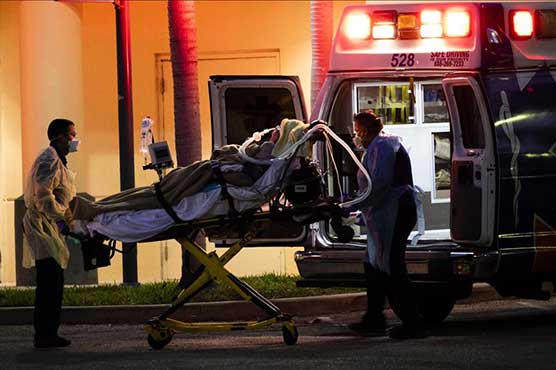US tops 130,000 deaths from COVID-19 after record surge in cases

Sixteen states have posted new record daily case counts this month.
NEW YORK (Reuters) - As US coronavirus cases surge and deaths topped 130,000, New York Governor Andrew Cuomo harshly criticized the White House s COVID-19 response on Monday, accusing President Donald Trump of "enabling" the virus and downplaying its threat.
Infections are on the rise in 39 states, according to a Reuters tally, and 16 states have posted record daily case counts in July. The surge has prompted many local leaders to slow or roll back economic reopenings despite Trump s insistence that the epidemic is being handled.
At a news conference on Monday, Cuomo, a Democrat who has clashed with the president over his efforts to tackle the health crisis, said Trump was "enabling" the virus if he failed to address the severity of the situation.
"Acknowledge to the American people that COVID exists, it is a major problem, it s going to continue until we admit it and each of us stands up to do our part," Cuomo said, directing his comments at the president.
During a speech at the White House on Saturday, Trump asserted without providing evidence that 99% of U.S. coronavirus cases were “totally harmless.”
Steve Adler, the Democratic mayor of Austin, Texas, on Monday also criticized Republican Trump s message.
"It s incredibly disruptive and the messaging coming from the president of the United States is dangerous," Adler told CNN.
White House Chief of Staff Mark Meadows on Monday defended Trump, saying the president was not trying to play down the deaths.
"But it s really to look statistically to know that whatever risks that you may have or I may have, or my, my children or my grandchildren may have, let s look at that appropriately and I think that s what he s trying to do," Meadows told reporters outside the White House.
REOPENINGS HALTED
Local leaders across the country are considering slowing down or rolling back business reopenings to curb spiking infection rates that are already overwhelming hospitals in some areas.
Mayor Carlos Gimenez of Florida s Miami-Dade County, which currently has some 48,000 COVID-19 cases, issued an emergency order on Monday shutting down on-site dining at restaurants and closing ballrooms, banquet facilities, party venues, gyms and fitness centers, and short-term rentals.
"We can tamp down the spread if everyone follows the rules, wears masks and stays at least six feet (2 meters) apart from others. I am counting on you, our 2.8 million residents, to stop the spread so that we can get back to opening our economy," Gimenez said in a statement.
After the announcement, some Miami chefs and restaurant owners said they felt they were facing the impossible predicament of balancing their businesses survival against the safety of their employees and guests.
"We re burned out emotionally, we re burned out financially, and we re burned out from the trauma of seeing everything that s happening," said Karina Iglesias, a partner at two popular downtown Miami Spanish restaurants.
Nationally, cases are approaching 3 million, by far the highest tally in the world and double the infections reported in Brazil, the world s second most-affected country.
Florida confirmed a record high 11,000 new cases in a single day, more than any European country reported in a day at the height of the crisis there.
Gimenez imposed an indefinite nightly curfew in Miami-Dade County on Friday and halted the reopenings of entertainment venues such as casinos and strip clubs.
In New York City, where the percentage of people testing positive for the virus has dropped to 1%, residents were allowed to enter nail and tanning salons on Monday as part of the city s Phase III of reopening, but Mayor Bill de Blasio delayed the resumption of indoor dining indefinitely.
Soaring case numbers and packed hospitals in Texas have prompted some mayors and other local leaders to consider launching a new round of stay-at-home orders. Cities are getting together and lobbying the state s governor to restore the authority to impose local anti-coronavirus measures, Austin Mayor Adler said.
"It s something that we re considering. It s only to be used as a last resort," Adler told CNN.

